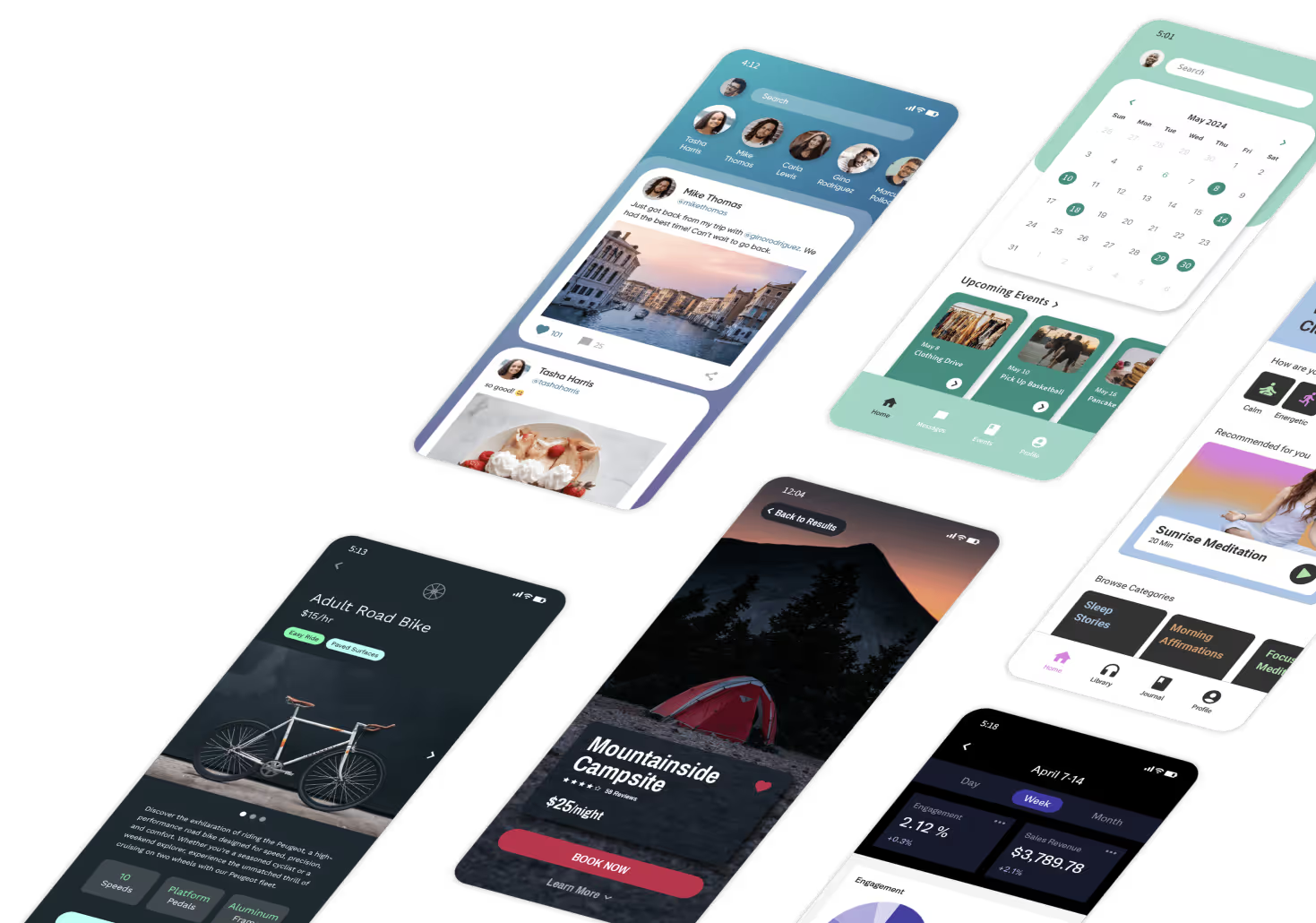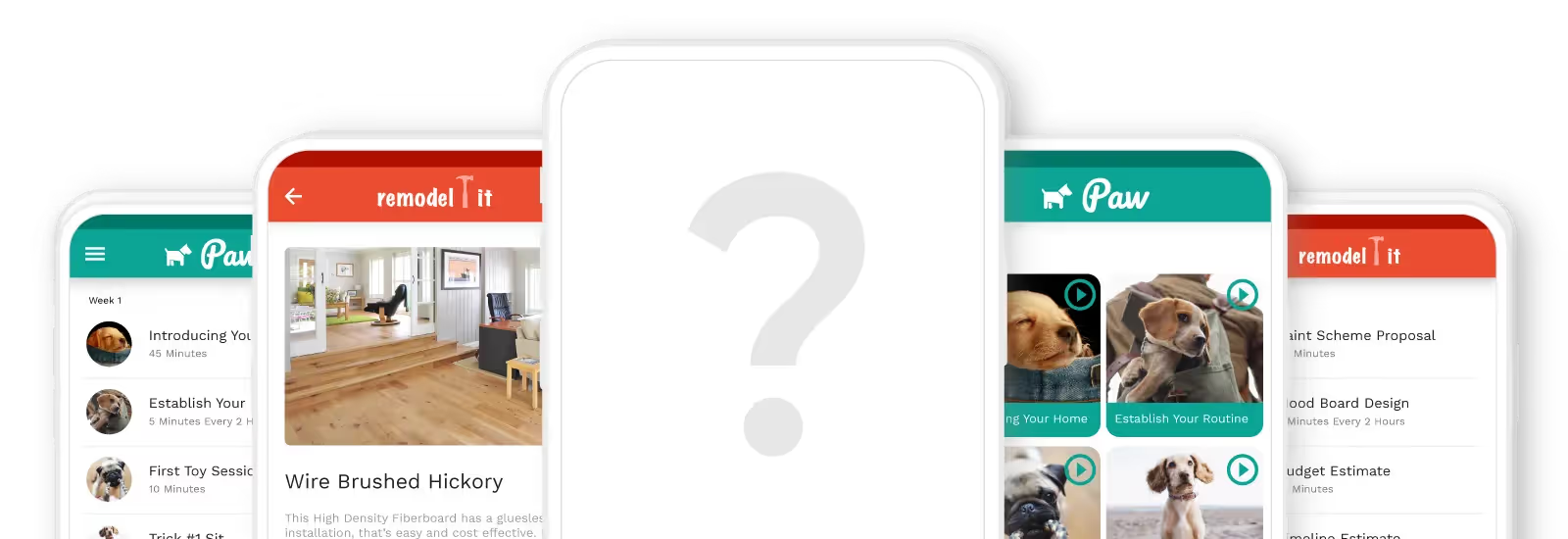There are many, many ways to optimize your time as a freelance mobile app developer – mobile app templates, automatic calendar booking for calls, and a well-crafted scope of work document. All of these tools and resources help you make the most of your time, which is one of your most valuable resources as a freelancer.

The goal is not to get MORE done, but to have LESS stuff to do!
That’s the bottom line! While it’s great to embrace the hustle and constantly push the barriers of what you can accomplish; the idea is for you to eventually have less to do, not more. So with that goal in mind, today we’ll break down the benefits of mobile app templates for anyone running an app building business.
Whether you’re a solo developer, or an agency that builds apps for clients, you can weigh the options and decide if mobile app templates are a good fit for your business!

A mobile app template! What’s that?
Before we get into whether or not you should use one, it’s important to know what an app template is, and why you might want to use one. Building even a basic app from scratch can be a long, time-consuming task that requires a good deal of money and effort.
No-code tools to build mobile apps have made it a lot easier to accomplish. Platforms like Adalo are a great alternative to building apps from scratch; with faster development at a lower cost, that doesn’t compromise on functionality.
Within the no-code landscape, there are templates that can serve as a framework, or the basic building blocks for the final app idea that you want to bring to life.
For example, you may have a mobile app template for a marketplace, or a social media platform like Instagram and Twitter. You could have a template for a community app, or a church app! It all depends on your clientele.

What are the benefits of mobile app templates?
As a no-code freelancer, there are TONS of benefits to using templates to build for your clients. Here are just a few:
- You can speed up your development process – time is money!
- You can customize your templates quickly and efficiently to meet your clients needs. Flexibility is the way to go!
- For your client, the overall development cost might be lower, given that you may not need as much time to ship their app.
- Less error prone! Since you’ve worked at getting that template just right, the odds of there being errors, broken flows, or any other bugs are significantly lower.
- You avoid repeating work where it isn’t necessary. This is a big one! As a freelancer, it’s easy to get caught in a rut of doing the same things over and over. Using mobile app templates helps minimize repetition so you can skip to the good part!

Can you use templates on Adalo?
Glad you asked! We’ve got a ready-to-deploy app template library ready for you to run with so you can jumpstart your app building. There are templates for classic apps like ordering, appointment setting, social media clones, eCommerce, directories and more!
That’s one way to go about it, especially if you’re new to building apps for clients on Adalo. But that’s not the only option you have – another handy approach that a lot of no-code freelancers use is to recycle their previous builds.
Let’s say for example, while you’re building a portfolio for yourself as a no-code freelancer and need to practice building certain apps, you could always use them as templates to help speed up the process for new clients.
Based on your client’s requirements, you can change any aspect of your templates’ design, functionality, or data layer, to make it your own.
Sounds great, right?

Here are some tips for using mobile app templates like a pro!
- Define your objectives with the templates you choose
If you’re building mobile app templates to highlight a particular skill that you have, make sure that features prominently in your work. If your objective is speed, then draw attention to how quickly you’re able to deliver on your work.
For easy ‘objective defining’, simple answer these questions, it’ll help you get started!
1. What purpose does this app serve?
2. How will users benefit from this app, does it solve a particular pain point?
3. Is it a full-service product, or will it focus on doing just one or two specific things?
4. How many users are you anticipating to install and use this app?
If you’ve defined your objectives clearly, the app templates you choose to showcase will speak for themselves.
- Work on perfecting the design and functionality of your template
Even if it’s just two or three key mobile app features, invest some time and thought into how you'd like the outcome to look. Consider the features that would appeal to MOST of your clients when deciding what to build. And once that’s in place, you can work making the design as awesome as possible so it wows potential clients right away! They should be able to visualize their own content and branding – layered on top of your well-designed canvas.
- Keep your templates versatile
Unless you’re a freelancer with a very specific niche, you’ll want your mobile app templates to be versatile to suit a wide client base. Instead of building multiple social media app templates, try building a wider range of app types that might suit different clients, until you’ve narrowed down on your market.

- Don’t build what YOU want, build what the customer might need
Before you create a mobile app template, find out what features your clients or customers would like to see. That way, you can develop something that impresses them, without you having to sell too hard. Take note of the ideas that get a lot of positive feedback. If people don’t seem to respond to an idea, there is a high chance that it won't perform well as a template. Your clients’ feedback is a valuable insight into what works, and what doesn’t.
- Start with the basics and then focus on improvement
There’s no point going all out and building a whole new world of features without testing them out a little. So keep your templates minimal, especially at the beginning. Then, with each round of iteration and feedback, you can improve on them.
If you have a long-term goal of having a beautiful template library of your own, remember that it won’t happen overnight! Developing the right app takes effort and hard work, but the investment is worthwhile.
Find out more about growing your business as a freelance mobile app developer!














